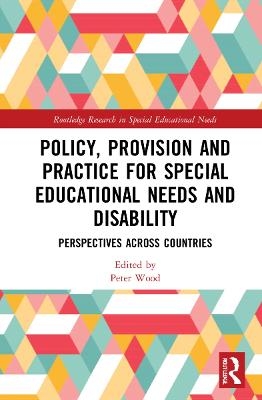
Policy, Provision and Practice for Special Educational Needs and Disability
Routledge (Verlag)
978-0-367-72499-3 (ISBN)
Situated across a backdrop of varied international policies relating to inclusion, the book offers insights into the rhetoric of SEND policy and practice across a range of settings to contribute to our understanding of SEND provision. It explores the complexities, concerns and challenges experienced by staff, pupils, parents and carers in contemporary education settings. Chapters draw on empirical research and are structured around four parts: special education needs and disability within policy; stakeholder perceptions and experiences of SEND provision; meeting the needs of SEND children; and moving towards inclusive practice.
The volume will challenge thought, stimulate critique and provoke debate in the field of special educational needs both locally and globally and will be of interest to researchers and postgraduate students in the field of inclusive education, special needs education and comparative education.
Peter Wood is Senior Lecturer in the School of Education at Liverpool John Moore’s University, UK. His interest in special educational needs and disability (SEND) stems from his time working in primary schools as a Learning Mentor. Peter’s research focuses on emotions and education, and specifically the ways disadvantage, inequality and discrimination frame experiences of social and emotional well-being in the educational space.
1. Introduction: Making the case for the exploration of special educational needs and disability policy, provision and practice across countries. Part one: Special education needs and disability within policy. 2. Culturally and linguistically diverse migrant students with special needs and disabilities: Essential policies and practices in the USA. 3. Education policy and inclusive education: People and processes. 4. Inclusive special needs and disability education: History, policies, practice and challenges in Kenya and Nepal. Part two: Stakeholder perceptions and experiences of SEND provision. 5. Special educational needs co-ordinators’ perceptions of effective provision for including autistic children in primary and middle schools in England. 6. School staff members’ and parents’ experiences of the inclusion of deaf children in Malaysian mainstream schools. Part three: Meeting the needs of SEND children: The role of the learning environment. 7. Inclusion in Norwegian schools: Pupils’ experiences of their learning environment. 8. A language focused approach to supporting children with social, emotional and behavioural difficulties. 9. Forest school as a space for risk for children with social, emotional and mental health needs. Part four: Moving towards inclusive practice. 10. A European consideration of early school leaving as a process running through childhood: A model for inclusive action. 11. Teacher education for SEND inclusion in an international context: The importance of critical theoretical work. 12. Conclusion: Positioning special educational needs and disability in contemporary teaching and learning. Index.
| Erscheinungsdatum | 04.01.2022 |
|---|---|
| Reihe/Serie | Routledge Research in Special Educational Needs |
| Zusatzinfo | 4 Tables, black and white; 4 Line drawings, black and white; 4 Illustrations, black and white |
| Verlagsort | London |
| Sprache | englisch |
| Maße | 156 x 234 mm |
| Gewicht | 453 g |
| Themenwelt | Sozialwissenschaften ► Pädagogik ► Allgemeines / Lexika |
| Sozialwissenschaften ► Pädagogik ► Bildungstheorie | |
| Sozialwissenschaften ► Pädagogik ► Sonder-, Heil- und Förderpädagogik | |
| ISBN-10 | 0-367-72499-5 / 0367724995 |
| ISBN-13 | 978-0-367-72499-3 / 9780367724993 |
| Zustand | Neuware |
| Haben Sie eine Frage zum Produkt? |
aus dem Bereich


